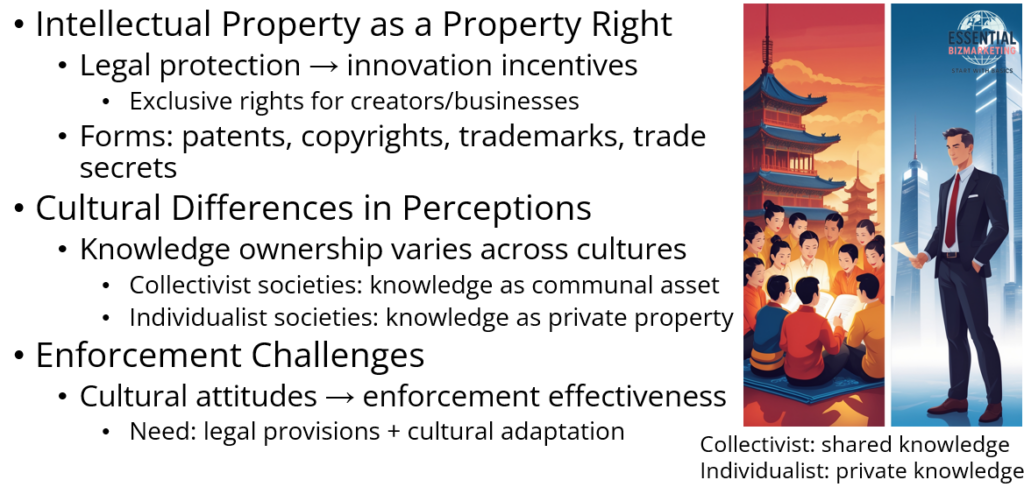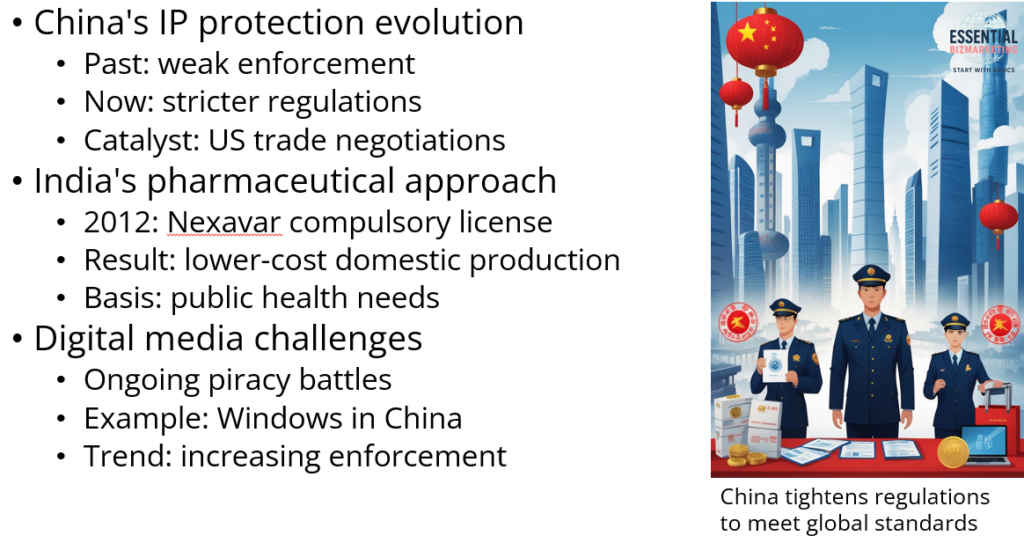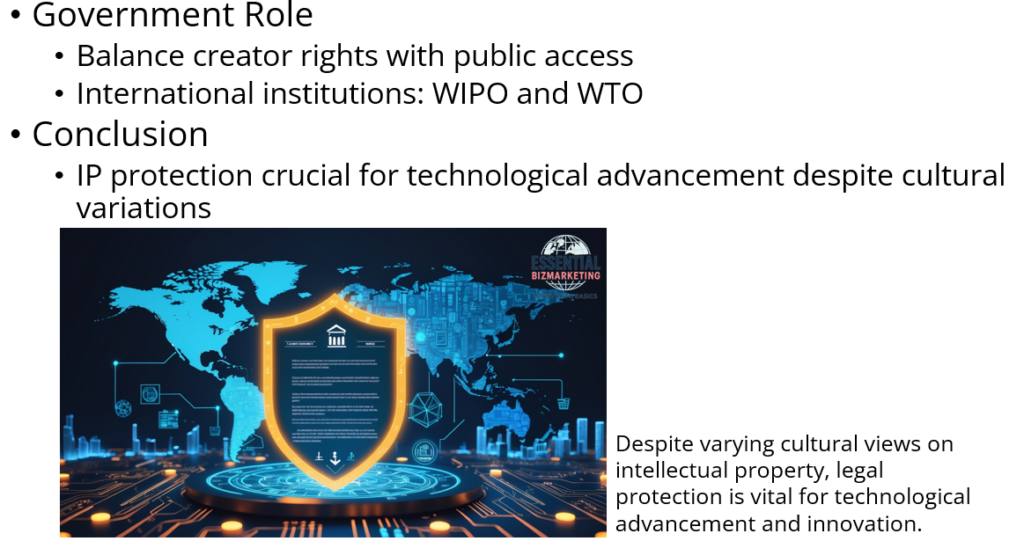Intellectual Property as a Property Right

Intellectual property (IP) is widely regarded as a form of property that deserves legal protection. The justification for this protection stems from the need to incentivize innovation and creativity. By granting exclusive rights to inventors, creators, and businesses, societies can ensure continuous investment in research, development, and artistic endeavors. In many legal frameworks, intellectual property encompasses patents, copyrights, trademarks, and trade secrets, each of which serves a distinct role in protecting different forms of intellectual output.
Cultural Differences in Perceptions of Knowledge and Property
Despite the legal frameworks supporting IP rights, perspectives on knowledge ownership vary across cultures. In certain societies, particularly those with a strong collectivist tradition, knowledge is often viewed as a communal asset rather than an individual’s proprietary right. A professor from China once remarked that, in China, knowledge is considered something to be shared rather than owned exclusively. This perspective aligns with the broader collectivist cultural framework, which prioritizes communal benefit over individual rights.
Challenges in Enforcing Intellectual Property Laws
Variations in cultural attitudes toward intellectual property present challenges in enforcing IP laws. In societies where knowledge is seen as a public good, enforcing legal protection can be met with resistance. Even when laws exist, people might not perceive them as legitimate, leading to widespread disregard for IP regulations. The enforcement of intellectual property rights, therefore, requires not only legal provisions but also cultural adaptation and public awareness campaigns.
Case Studies on Intellectual Property Disputes

Several real-world cases illustrate the complexity of intellectual property enforcement. One such example is China’s historical approach to IP protection. In the past, China was often criticized for weak IP enforcement, with many companies accused of intellectual property theft. However, in recent years, the Chinese government has introduced stricter regulations and stronger enforcement mechanisms to align with global standards, particularly in response to trade negotiations with the United States.
Another notable case involves India’s approach to pharmaceutical patents. In 2012, India issued a compulsory license for Bayer‘s cancer drug Nexavar, allowing a domestic company to produce a generic version at a significantly lower price. The Indian government justified this action on the grounds of public health, arguing that essential medicines should be accessible to all, rather than restricted by patent protections held by multinational corporations.
Similarly, the software and digital entertainment industries face ongoing battles against piracy and copyright infringement. In countries with less stringent enforcement mechanisms, unauthorized distribution of software, music, and movies is widespread. Microsoft, for example, faced significant challenges in China due to the high prevalence of pirated versions of Windows operating systems. However, increasing pressure from foreign corporations and trade partners has prompted the Chinese government to strengthen copyright enforcement efforts in recent years.
The Role of Government in Intellectual Property Protection

The establishment of strong intellectual property laws requires sustained governmental efforts. Governments must balance protecting the rights of inventors and creators with ensuring fair access to knowledge and innovation. This process often involves legal reforms, international agreements, and technological measures to prevent IP violations. Institutions such as the World Intellectual Property Organization (WIPO) and the World Trade Organization (WTO) play key roles in setting international IP standards and resolving disputes between nations.
Conclusion: The Necessity of IP Protection for Knowledge and Technology Creation
Although cultural perceptions of intellectual property vary, legal protection remains a crucial factor in fostering technological advancement and innovation. Without robust IP laws, creators and businesses may lack the incentives needed to invest in new ideas, ultimately hindering progress. Therefore, while recognizing cultural differences, it is essential to maintain strong intellectual property protection mechanisms to support the continued creation of knowledge and technology.
📚 References
Bernard Orr & Ethan Wang, Reuters – “US official says IPR infringement still main concern in China” (Apr. 16, 2024) retrieved from: https://www.reuters.com/world/us/us-official-says-ipr-infringement-still-main-concern-china-2024-04-16/#:~:text=BEIJING%2C%20April%2016%20%28Reuters%29%20,face%20significant%20challenges%20with%20infringement
Zeba Siddiqui, Reuters – “India rejects Gilead’s Hepatitis C drug patent request” (Jan. 14, 2015) retrieved from : https://www.reuters.com/article/gilead-india-patent/india-rejects-gileads-hepatitis-c-drug-patent-request-idINL3N0UT4PB20150114/#:~:text=The%20patent%20office%27s%20order%20said,improve%20efficacy%20of%20the%20drug
Alex Hern, The Guardian – “Streaming was supposed to stop piracy. Now it is easier than ever” (Oct. 2, 2021) retrieved from : https://www.theguardian.com/film/2021/oct/02/streaming-was-supposed-to-stop-piracy-now-it-is-easier-than-ever#:~:text=And%20after%20just%20a%20few,to%20drive%20even%20more%20piracy
Philip Blenkinsop, Reuters – “EU launches WTO dispute against China over telecom patents” (Feb. 18, 2022) retrieved from : https://www.reuters.com/business/eu-challenges-china-wto-over-telecom-patent-protection-2022-02-18/#:~:text=The%20bloc%20believes%20China%20is,TRIPS
Tim Smedley, The Guardian – “Patent wars: has India taken on Big Pharma and won?” (May 14, 2013) retrieved from : https://www.theguardian.com/sustainable-business/patent-wars-india-takes-on-big-pharma#:~:text=pharmaceutical%20products%20or%20not,all%20markets%20as%20of%202005
Cory Doctorow, The Guardian – “Why poor countries lead the world in piracy” (May 3, 2011) retrieved from : https://www.theguardian.com/technology/2011/may/03/why-poor-countries-lead-world-piracy#:~:text=Media%20Piracy%27s%20core%20thesis%20is,purchasing%20is%20about%20the%20same
Emma Farge, Reuters – “UN data: Global patent filings drop nearly 2% as innovation falters” (Mar. 7, 2024) retrieved from : https://www.reuters.com/world/un-data-global-patent-filings-drop-nearly-2-innovation-falters-2024-03-07/#:~:text=,economist%20Carsten%20Fink%20told%20reporters
Helen Nyambura-Mwaura, Reuters – “Inventors struggle to protect patents in Africa” (July 17, 2014) retrieved from : https://www.reuters.com/article/us-africa-investment/inventors-struggle-to-protect-patents-in-africa-idUSKBN0FM0HQ20140717/#:~:text=In%20many%20countries%20in%20Africa%2C,affair%20of%20registering%20their%20products
📁 Start exploring the Blog
📘 Or learn more About this site
🧵 Or follow along on X (Twitter)
🔎 Looking for sharp perspectives on global trade and markets?
I recommend @GONOGO_Korea as a resource I trust and regularly learn from.
